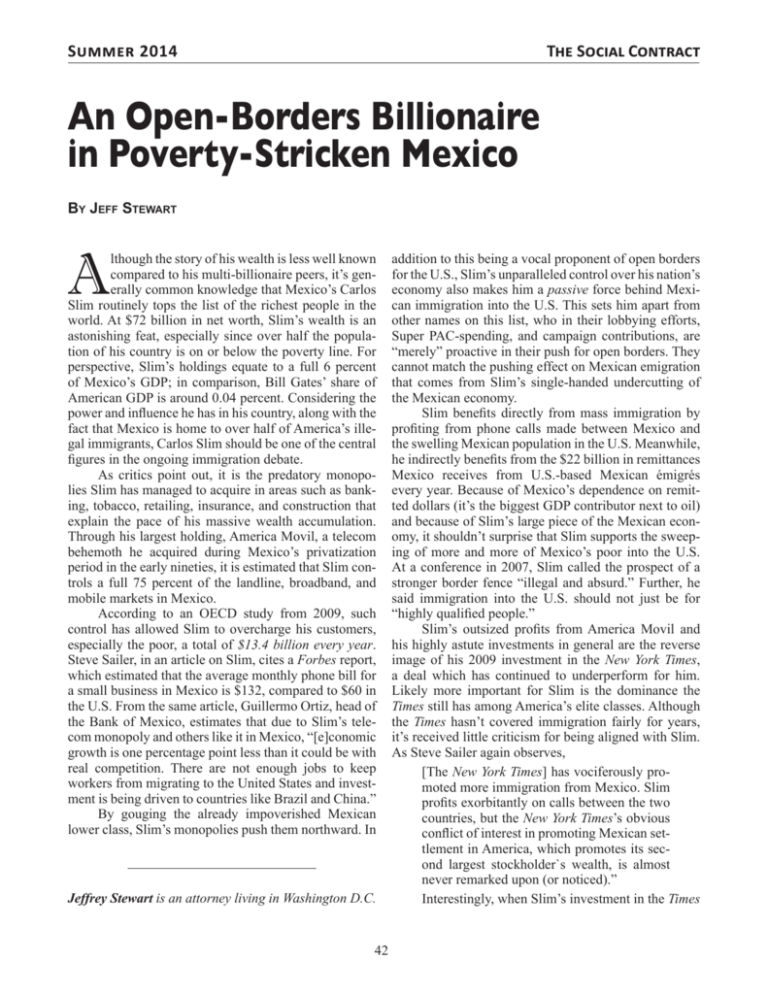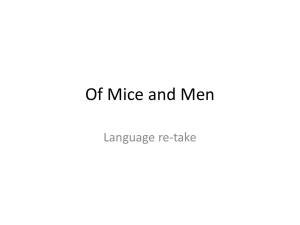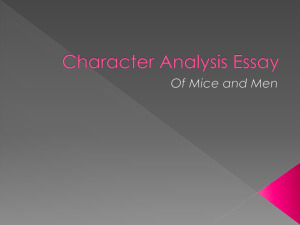An Open-Borders Billionaire in Poverty
advertisement

Summer 2014 The Social Contract An Open-Borders Billionaire in Poverty-Stricken Mexico By Jeff Stewart A lthough the story of his wealth is less well known compared to his multi-billionaire peers, it’s generally common knowledge that Mexico’s Carlos Slim routinely tops the list of the richest people in the world. At $72 billion in net worth, Slim’s wealth is an astonishing feat, especially since over half the population of his country is on or below the poverty line. For perspective, Slim’s holdings equate to a full 6 percent of Mexico’s GDP; in comparison, Bill Gates’ share of American GDP is around 0.04 percent. Considering the power and influence he has in his country, along with the fact that Mexico is home to over half of America’s illegal immigrants, Carlos Slim should be one of the central figures in the ongoing immigration debate. As critics point out, it is the predatory monopolies Slim has managed to acquire in areas such as banking, tobacco, retailing, insurance, and construction that explain the pace of his massive wealth accumulation. Through his largest holding, America Movil, a telecom behemoth he acquired during Mexico’s privatization period in the early nineties, it is estimated that Slim controls a full 75 percent of the landline, broadband, and mobile markets in Mexico. According to an OECD study from 2009, such control has allowed Slim to overcharge his customers, especially the poor, a total of $13.4 billion every year. Steve Sailer, in an article on Slim, cites a Forbes report, which estimated that the average monthly phone bill for a small business in Mexico is $132, compared to $60 in the U.S. From the same article, Guillermo Ortiz, head of the Bank of Mexico, estimates that due to Slim’s telecom monopoly and others like it in Mexico, “[e]conomic growth is one percentage point less than it could be with real competition. There are not enough jobs to keep workers from migrating to the United States and investment is being driven to countries like Brazil and China.” By gouging the already impoverished Mexican lower class, Slim’s monopolies push them northward. In Jeffrey Stewart is an attorney living in Washington D.C. 42 addition to this being a vocal proponent of open borders for the U.S., Slim’s unparalleled control over his nation’s economy also makes him a passive force behind Mexican immigration into the U.S. This sets him apart from other names on this list, who in their lobbying efforts, Super PAC-spending, and campaign contributions, are “merely” proactive in their push for open borders. They cannot match the pushing effect on Mexican emigration that comes from Slim’s single-handed undercutting of the Mexican economy. Slim benefits directly from mass immigration by profiting from phone calls made between Mexico and the swelling Mexican population in the U.S. Meanwhile, he indirectly benefits from the $22 billion in remittances Mexico receives from U.S.-based Mexican émigrés every year. Because of Mexico’s dependence on remitted dollars (it’s the biggest GDP contributor next to oil) and because of Slim’s large piece of the Mexican economy, it shouldn’t surprise that Slim supports the sweeping of more and more of Mexico’s poor into the U.S. At a conference in 2007, Slim called the prospect of a stronger border fence “illegal and absurd.” Further, he said immigration into the U.S. should not just be for “highly qualified people.” Slim’s outsized profits from America Movil and his highly astute investments in general are the reverse image of his 2009 investment in the New York Times, a deal which has continued to underperform for him. Likely more important for Slim is the dominance the Times still has among America’s elite classes. Although the Times hasn’t covered immigration fairly for years, it’s received little criticism for being aligned with Slim. As Steve Sailer again observes, [The New York Times] has vociferously promoted more immigration from Mexico. Slim profits exorbitantly on calls between the two countries, but the New York Times’s obvious conflict of interest in promoting Mexican settlement in America, which promotes its second largest stockholder`s wealth, is almost never remarked upon (or noticed).” Interestingly, when Slim’s investment in the Times Summer 2014 recently rose to 17 percent, like his initial investment, it was met with little coverage, let alone outcry. By contrast, when it was alleged that the Koch brothers were in talks to purchase the Los Angeles Times, a far smaller and more or less regional paper, coverage across the mainstream media was deafening. Whether it’s fair to assume Slim can steer the Times’s editorial board, former Times contributor Andreas Martinez writes: Slim doesn`t have to interfere at all. I know from experience that publishers do intervene in the editorial process, as is their prerogative. And I can assure you that Slim’s investment will be a factor, even if unspoken, in editorial decision-making henceforth at the Times. When the Schumer-Rubio amnesty bill was introduced in 2013, next to nothing was reported on about Slim’s involvement. Tucked away in the 856-page bill was a provision giving free mobile phones to illegal aliens. The item was brief, lacked detail, and had all the trappings of an earmark, a practice that was supposed to be banned in the Senate in 2011 following years of public outrage for its association with cronyism. Most to benefit from the program would have been Slim’s The Social Contract Miami-based TracFone Wireless Inc., the biggest maker of pre-paid mobile phones for which Senator Rubio’s Chief of Staff, Cesar Conda, was once a top lobbyist. Conda had also been a lobbyist for Slim’s group during Obama’s expansion of the “Lifeline” program, which provided free mobile phones (“Obama Phones”) to welfare recipients. In a recent interview, Slim attempted to counter the negative perception surrounding his outsized wealth by arguing: “to say that in poor countries there should not be wealthy people and strong companies is like saying that there should not be world-class scientists, engineers, architects, etc.” But Slim’s argument is erroneous. As is common in poor countries with weak governance, in Mexico corruption and cronyism are rife, with top-level bureaucrats and politicians doling out public assets and privileges to friends, family, and the highest bidders. People like Slim can therefore to some extent be created. Nobel Prize-winners, by contrast, cannot. Although Mexico’s produced a multi-billionaire like Slim (and others), due to the poverty faced by the rest of the country, it has produced only a single Nobel laureate in science. This may be what America’s future will look like, if Slim has his way. ■ PAUL SINGER — GOP MEGA-DONOR P aul Singer, 69, is the supremo of the Elliott Management hedge fund. As such he has been variously described as one of the world’s “vulture capitalists.” He specializes in investing in distressed or bankrupt companies (such as Chrysler and Delphi) and distressed countries (such as Peru and the Congo). As we go to press, the financial news journals are reporting on his efforts to cash in on Argentina’s foreign debt. Singer has long been a major funder of homosexual activist organizations. He has given millions of dollars to gay-rights initiatives across the country and is considered “pivotal in rounding up about $250,000 apiece for the Republican state senators in New York whose votes for same-sex marriage provided its margin of victory in the Legislature” [Frank Bruni, “The G.O.P.’s Gay Trajectory,” New York Times, June 9, 2012]. Immigration is a relatively new cause for Singer. He was the key donor behind Mitt Romney’s 2012 campaign for president and is credited with persuading Romney not to focus on immigrationrelated issues. In 2013, he helped fund the National Immigration Forum’s Evangelical Immigration Table initiative. The objective here was to influence conservative Christians to drop their opposition to illegal immigration and instead embrace open borders. It happens that NIF is one of George Soros’s principle vehicles for influencing immigration policy. With Soros, Singer’s chief interest in this area is to buy support for the Senate Gang of Eight immigration bill. Singer, Adelson, and their fellow Republican super-donors are doing all they can to see that amnesty for illegal aliens and increased legal immigration of foreign workers enjoys “bi-partisan” support. [Tamara Keith, “Super Donor Backs Romney—and Gay Marriage,” “All Things Considered,” NPR, April 17, 2012; Matthew Boyle, “Romney’s Top Donor Teams with Soros Front Group on Immigration Reform,” Breitbart.com, August 23, 2013]. ■ —Wayne Lutton 43








